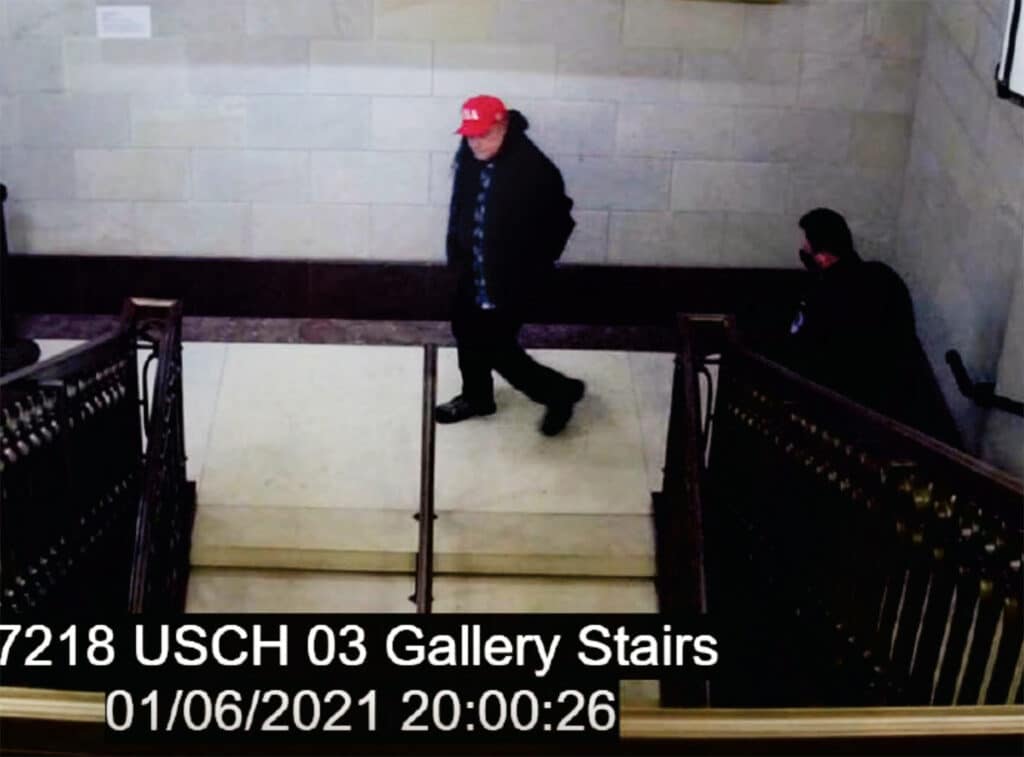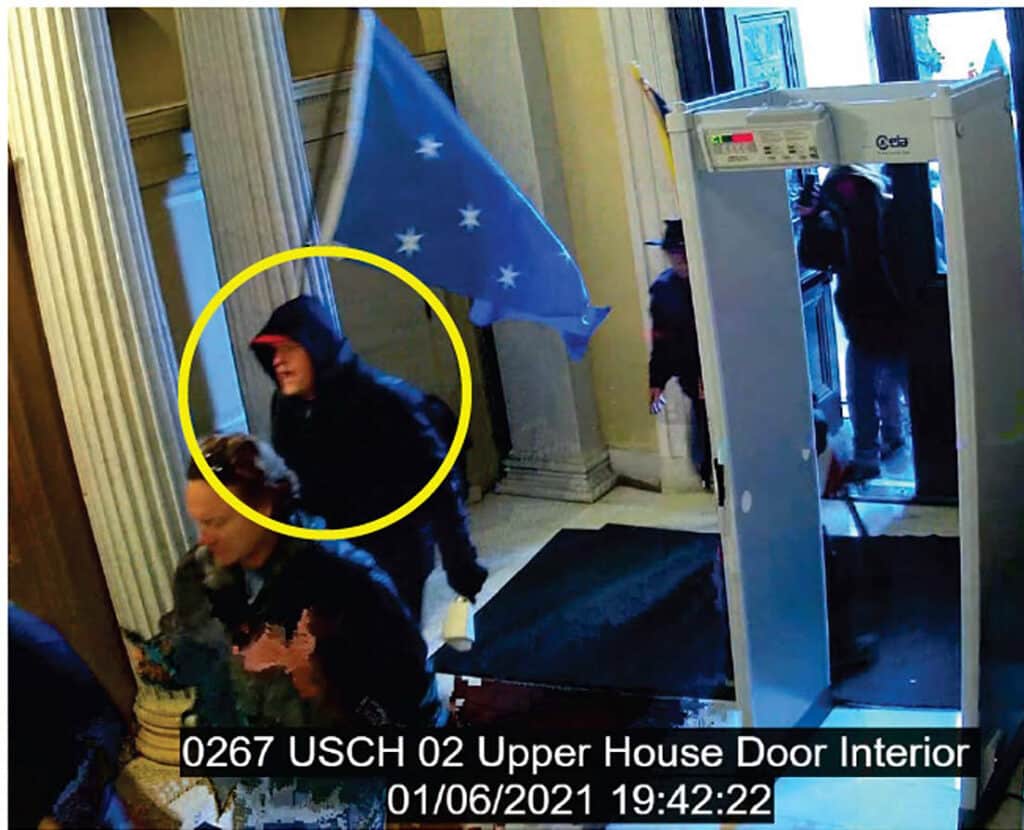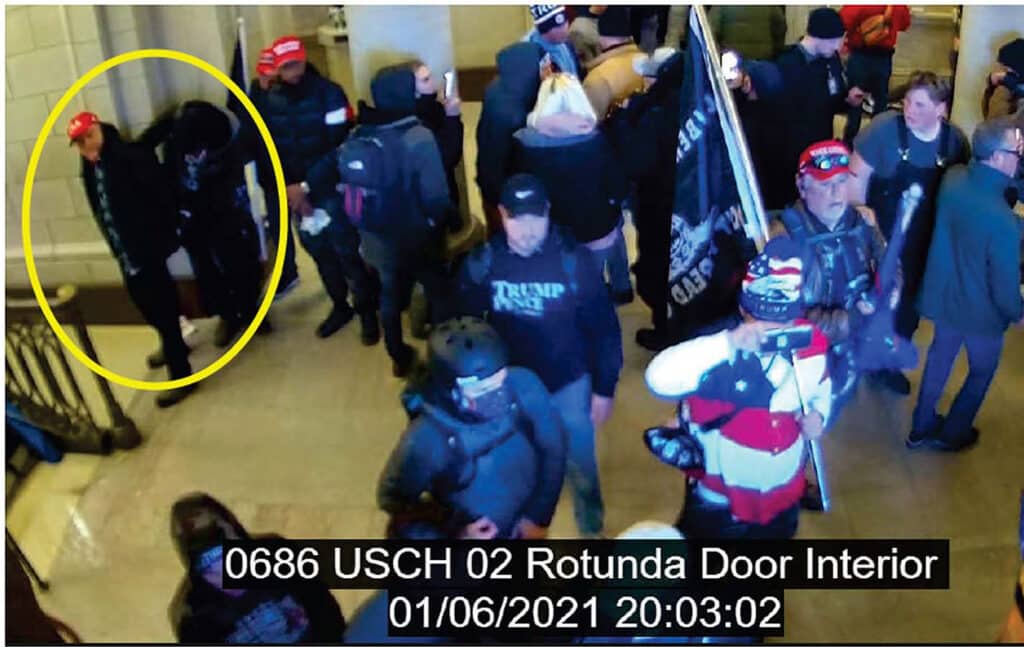Community Government Police & Fire
Local businessman David Rhine sentenced in Jan. 6 Capitol riot
Editor’s note: President Donald Trump pardoned Rhine and others convicted in connection the Jan. 6 upon taking office in 2025.
A Gig Harbor businessman will serve four months in prison for his participation in the Jan. 6, 2021, U.S. Capitol riot.
David Rhine, 54, sought one year of probation and 100 hours of community service. The government asked for one year of incarceration, one year of supervised release, 60 hours of community service and $500 in restitution.
U.S. District Judge Rudolph Contreras sentenced Rhine, of Bremerton, to four months of incarceration for each of four misdemeanors, to run concurrently, followed by one year of supervised release on each count, concurrently. Contreras ordered Rhine to pay a $7,376 fine but no restitution.

Security footage submitted as evidence by prosecutors shows David Charles Rhine in the Capitol building on Jan. 6, 2021.
Rhine and thousands of President Donald Trump supporters disrupted a joint session of Congress that was meeting to certify President-elect Joe Biden’s victory. He was convicted on April 24 in U.S. District Court for the District of Columbia of all four crimes of which he was charged:
- Entering and remaining in a restricted building or grounds;
- Disorderly and disruptive conduct in a restricted building or grounds;
- Disorderly conduct in a Capitol building or grounds;
- Parading, demonstrating or picketing in a Capitol building.
Inside just 22 minutes
Rhine, who owns Cox & Lucy CPAs on Soundview Drive, spent just 22 minutes inside the Capitol building. He entered on the second floor through the Upper House door at 2:42 p.m., wearing a dark blue hooded jacket, red baseball cap embroidered with “USA” and a backpack. He was carrying a blue flag with white stars known as the Navy Jack, and white cowbells.
A Capitol Police officer detained Rhine, searched him, seized two pocketknives and pepper spray, and put him in flex cuffs. The officer escorted Rhine to the Rotunda door and told him to leave, which video footage showed him doing at 3:04 p.m.

Security footage submitted as evidence by prosecutors shows David Charles Rhine in the Capitol building on Jan. 6, 2021.
Public defender Rebecca Fish argued for leniency because Rhine had no prior criminal history, a record of public service, and didn’t participate in violence or maliciousness while in the Capitol. He walked or stood for seven minutes in areas that would typically be open to the public before the police officer sidetracked him.
With a background as a former Navy submarine propulsion plant operator who went on to earn bachelor’s and master’s degrees and open his own accounting firm, he posed no danger to the public and didn’t require rehabilitation, Fish wrote.
Expected a peaceful protest
She said Rhine attended a permitted protest on the Capitol grounds by himself, and believed the demonstration would be peaceful. He was convinced by high-ranking government officials and other public figures that the 2020 election was a fraud, and he wanted to voice his right to free speech.
The charges and conviction alone are sufficient punishment, Fish wrote. Rhine lost his privacy and was scorned by many in his community. Customers stopped frequenting his business. He could lose his CPA license. He moved his wife and teenage son to New York to escape stress and harassment. Rhine resigned as treasurer of the nonprofit USS Turner Joy museum ship board to avoid negative publicity.

Security footage submitted as evidence by prosecutors shows David Charles Rhine in the Capitol building on Jan. 6, 2021.
Rhine is ashamed he was anywhere near the Capitol on that day, Fish wrote.
“Still, Mr. Rhine is truly sorry for his role in the events that day,” she said. “He recognizes that his presence at the Capitol contributed to the fear, pain and trauma that impacted so many people. He takes responsibility for this and is working to make amends for his poor decision.”
The judge took those factors into account. He also weighed the government’s arguments that Rhine’s sentence should be at the higher end of the misdemeanor scale.
Government pushed for prison
U.S. Attorney Matthew Graves wrote that Rhine:
- Gave a recorded interview outside the Capitol in which he said his intent was to prevent Congress from certifying the Electoral College vote. He stated, in part: “It is time for us to take this and to take it back. We are sick and tired of the cheating. We are here to stop the steal.” (He also said in the interview that, “Hopefully, we can keep people peaceful” and later, when somebody was trying to force open a door inside, “Hey, hey, don’t break the door” and “Don’t damage. This is a sacred place.”)
- Joined the first wave of rioters to enter the Capitol through the Upper House door 30 seconds after it was breached.
- Carried dangerous weapons into the Capitol.
- Did more than passively demonstrate, zeroing in on the House chamber where certification was to occur, on the House gallery where members were hiding and entering the Appropriations Committee office.
- Left the Capitol building only after Capitol Police officers detained him, escorted him downstairs to the Rotunda Door and directed him to leave.
Generally, the government said with Rhine’s education and military and small business background, he should’ve known better than to take part in the riot.

Security footage submitted as evidence by prosecutors shows David Charles Rhine in the Capitol building on Jan. 6, 2021.
Joins a large crowd
He “participated in the Jan. 6 attack based on an apocalyptic, conspiratorial view of the political process and the conviction that he was entitled to take things in his own hands to correct a perceived electoral injustice,” Graves wrote. “… A meaningful deprivation of liberty will hopefully underscore for Rhine the difference between political advocacy and violent rioting, as well the criminal nature of his conduct in this case.”
Rhine remains free on his personal recognizance, as he has been since he was arrested at his office on Nov. 8, 2021, until time to self-surrender. He didn’t respond to an email request for comment.
In the 31 months since the riot, law enforcement has arrested more than 1,106 people in nearly all 50 states for crimes related to the breach of the U.S. Capitol, including more than 350 charged with assaulting or impeding law enforcement. The attack injured more than 100 police officers and resulted in more than $2.9 million in damages.
